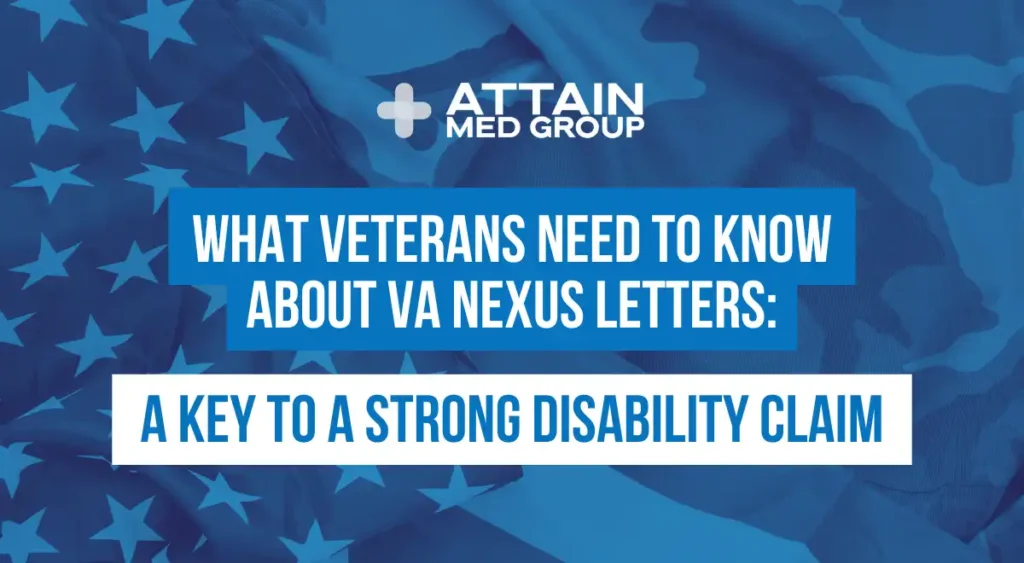Filing a VA disability claim can be confusing and stressful. Veterans often find themselves navigating a sea of paperwork, medical records, and VA regulations. One of the most important—yet often misunderstood—tools for a successful claim is the VA nexus letter.
At AMG, we know how critical it is for veterans to submit strong medical evidence. A nexus letter can be the difference between an approved claim and a denial. In this guide, we’ll explain exactly what a nexus letter is, why it matters, who can write one, and how it can support your path to receiving the benefits you’ve earned through service.
What Is a VA Nexus Letter?
A VA nexus letter is a medical document that connects your current diagnosis to your military service. Written by a qualified medical professional, it helps establish the “nexus,” or link, between your disability and a specific incident, condition, or exposure that occurred during service.
In short, this letter tells the VA: “This veteran’s condition is, at least as likely as not, caused by or related to their time in the military.”
Without this connection clearly outlined by a medical expert, your claim may lack the evidence needed to prove service connection—especially for conditions that are not automatically presumed to be related to military service.

Why Is a Nexus Letter So Important?
The VA requires strong evidence to grant service-connected disability benefits. While your personal statements and service records are important, a well-documented medical opinion can carry significant weight.
Here’s how a strong nexus letter helps your claim:
- Bridges the gap between current medical conditions and past military service
- Strengthens claims that may lack clear documentation in service records
- Clarifies complex medical issues in language VA reviewers understand
- Helps in denied claims or appeals where service connection was previously not established
In many cases, it is the deciding factor that tips the scale toward approval.
Who Can Write a Nexus Letter?
Not every medical provider is qualified—or willing—to write a nexus letter. The most credible letters come from licensed professionals such as:
- MDs or DOs (Doctors of Medicine or Osteopathy)
- Psychiatrists or Psychologists (for mental health conditions)
- Nurse Practitioners or Physician Assistants (in certain states and under supervision)
The provider must be familiar with your condition and able to review your complete medical history, including service treatment records and any relevant private or VA documentation.
The VA gives more weight to specialists when dealing with complex conditions. For example, a cardiologist’s opinion on a heart condition will typically carry more authority than a general practitioner’s.
Can a VA Doctor Write a Nexus Letter?
Sometimes, but not always. VA doctors are not prohibited from writing nexus letters, but many decline due to workload or internal policy. Some may prefer to complete a Disability Benefits Questionnaire (DBQ), which can still support your claim—but it is not a replacement for a detailed nexus letter.
If you work with a VA provider, it never hurts to ask politely and explain exactly what is needed.
Should You Use a Private Doctor or Independent Medical Examiner (IME)?
Many veterans seek out private providers or IMEs for this reason. These professionals are experienced in writing nexus letters tailored to VA standards and often provide more detailed, objective reports.
Keep in mind:
- They may charge a fee for the service
- You’ll need to supply relevant medical and service records
- Their opinion may be especially valuable if your claim involves a prior denial or complex condition
What Makes a Nexus Letter Effective?
A credible nexus letter is detailed, evidence-based, and clearly written. It must include:
| Component | Description |
| Record Review | A statement confirming the provider reviewed your service treatment records, private medical history, and current documentation. |
| Diagnosis | A clear identification of your current condition. |
| Medical Opinion | A statement linking your condition to military service, using VA-recognized terminology like “at least as likely as not.” |
| Medical Rationale | An explanation of how the condition developed or was worsened due to service, supported by medical reasoning or literature. |
| Credentials | The author’s qualifications, specialty, and experience with VA claims. |
| Signature & Contact Info | A signed, dated letter with license number and contact details. |
A vague or poorly written letter, or one from an unqualified provider, may hurt rather than help your claim.

Types of Claims a Nexus Letter Supports
Nexus letters are relevant to several types of service connection:
1. Direct Service Connection
When a condition started or was caused during active duty. Example: A back injury during deployment that led to chronic pain.
2. Secondary Service Connection
When a new condition is caused or aggravated by an existing service-connected disability. Example: Diabetes leading to neuropathy.
3. Aggravated Pre-existing Conditions
If military service worsened a pre-existing condition beyond natural progression. Example: Flat feet aggravated by physical demands during service.
Do You Need a Nexus Letter?
A nexus letter may be especially important if:
- Your condition appeared years after separation
- Your service records don’t clearly document the issue
- You’re claiming a secondary or aggravated condition
- Your claim has been denied due to lack of medical evidence
- Your condition is not on the VA’s presumptive list
If you’re unsure, AMG’s VA-accredited advocates can help evaluate whether a nexus letter would strengthen your case.
How to Get a Strong Nexus Letter
Here are the steps we recommend:
- Talk to Your Doctor or IME
Explain that you’re filing a VA claim and need a medical opinion linking your condition to service. - Provide Full Medical Records
Include service treatment records, private medical files, and any relevant VA documentation. - Educate the Provider
If they are unfamiliar with VA claims, explain the importance of the “at least as likely as not” standard. - Request a Detailed Letter
Ensure it includes all required components listed above. - Review Before Submission
Look for vague language, missing information, or incorrect terminology.
Common Mistakes to Avoid
- Using vague or non-committal language (“might be due to service”)
- Submitting letters from unqualified providers
- Failing to include a record review or medical rationale
- Submitting letters that simply repeat your own statements
- Submitting a letter without proof of credentials or signature
Avoiding these pitfalls will significantly improve your chances of a successful claim.

Nexus Letters and the Appeals Process
If your VA claim has been denied, a nexus letter can be critical to your appeal. Often, the missing piece is a clear medical link between your service and current condition. Submitting a new or more detailed nexus letter during the appeals process may be the strongest way to overturn a denial.
At AMG, we frequently help veterans obtain nexus letters specifically designed to address the VA’s reasoning for denial. Whether you’re submitting a Supplemental Claim or pursuing a Board appeal, medical evidence remains key.
Final Thoughts
A well-prepared nexus letter can make all the difference in your VA disability claim. It provides the clear, credible medical opinion the VA needs to understand how your current condition relates to your time in service.
At AMG, we’re committed to guiding veterans through every step of the claims process. If you need help finding a qualified medical provider or reviewing your existing medical evidence, contact our team. We’re here to ensure your service-connected disabilities are properly recognized and compensated.

